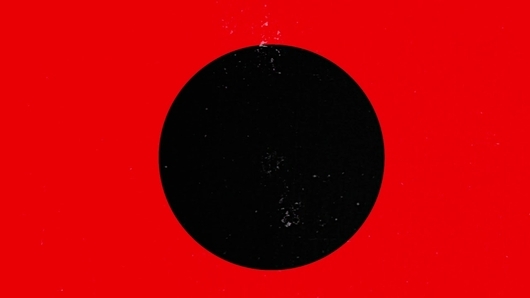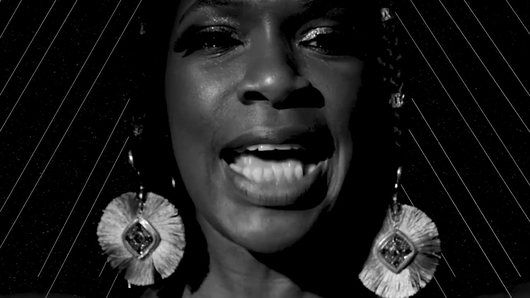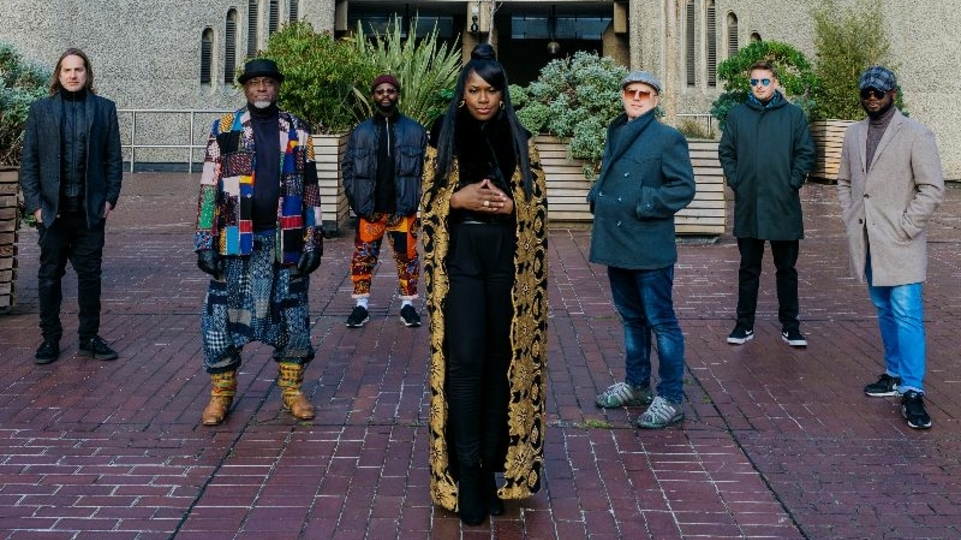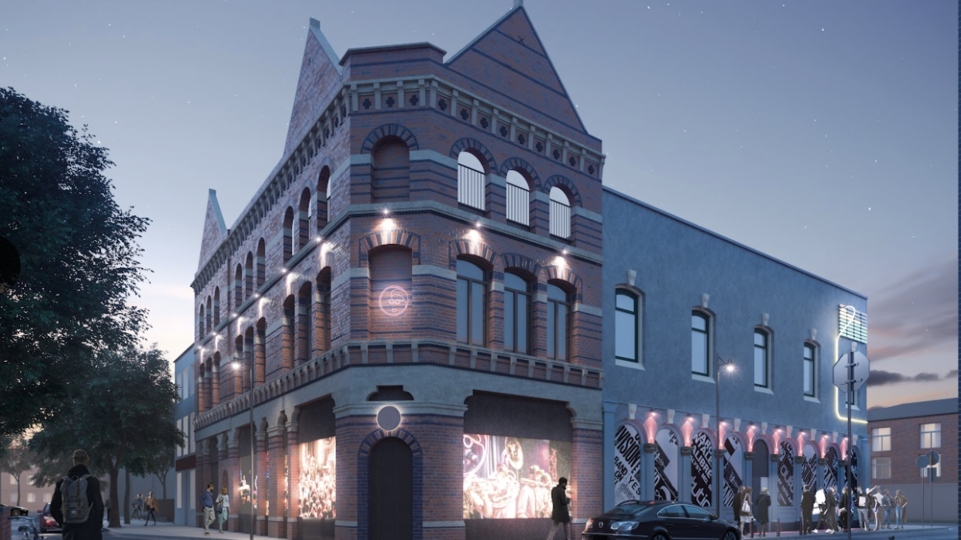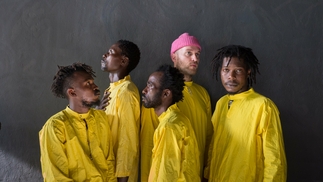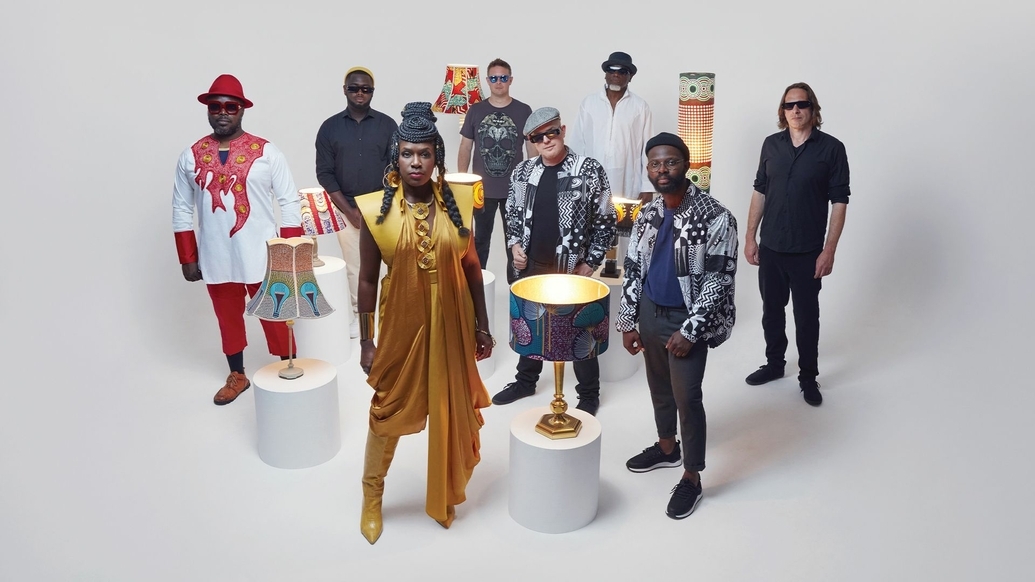
Ibibio Sound Machine: positive electricity
London’s Ibibio Sound Machine are back with their fourth album ‘Electricity’. Produced by Hot Chip, the release is more electronic than ever, but retains their classic Afro funk energy. Ben Murphy speaks to vocalist and songwriter Eno Williams and co-founder/saxophonist Max Grunhard about expanding their sound, mixing English and Ibibio lyrics, and the endless joys of playing live
"We started a lot of the songs not knowing what was happening, not knowing where the world was really going,” Eno Williams says, talking about the recording of her band Ibibio Sound Machine’s triumphant new record during lockdown. “There was an uncertainty, a darkness. But we tried to find the light at the end of the tunnel. Growing up with my background in Nigeria, everyone got on with it and found positivity. No matter how bad things were, you had to get on with life really. That’s what we try to embody as a band — hope, positivity, looking up.”
Though it was written and recorded during the anxious times of the pandemic, Ibibio Sound Machine’s fourth album, ‘Electricity’, is a life-affirming joy. Its lyrics might address issues of loneliness and isolation, but even at their most lovelorn, the songs are uplifting, danceable gems.
The eight-piece London band — led by British-Nigerian singer and songwriter Eno Williams and Australian band co-founder and saxophonist Max Grunhard — have honed their distinctive mix of West African funk and synth-driven electronics with each successive album, becoming a formidable live act in the process. A regular feature of festival stages and an international touring band, their music has found favour with taste-making DJs like Gilles Peterson, while their tunes receive frequent play on stations like BBC Radio 6 Music.
‘Electricity’, released this month on Merge Records, finds them widening their scope, mixing exultant vocals, melodic hooks and tight playing with a more euphoric, electronic dance edge. With the worst effects of coronavirus hopefully beginning to abate (notwithstanding the grim, looming spectre of a world war), it’s the celebratory record we sorely need. “We tried to structure the album like the darkness was the beginning, and then it gradually gets brighter towards the end,” Max Grunhard says.
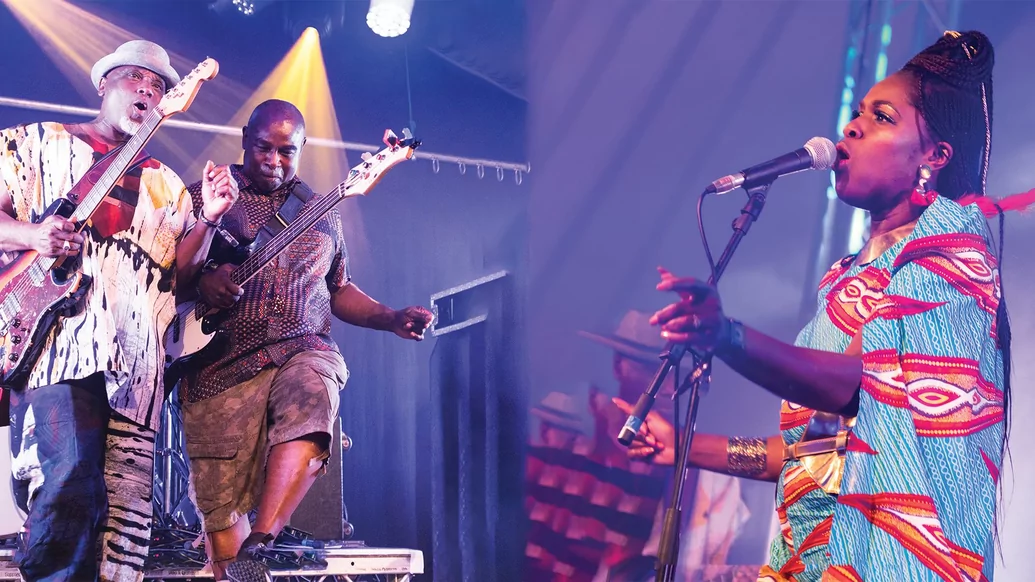
Normally handling the album production themselves, for the first time, Ibibio Sound Machine enlisted another electronic act, Hot Chip, to add some dance sparkle to the project. Having both admired each other’s performances at various festival appearances, they had a mutual appreciation.
“We were fans of theirs already,” Max says, sat beside Eno as DJ Mag talks to them via Zoom. After working together for years, it’s evident they have a great rapport, finishing each other’s sentences, with Eno occasionally erupting into bouts of laughter.
“We played before Hot Chip at a festival called Blue Dot in Manchester, and it’s a great band. We thought it would be cool to try and take it to a different level with Hot Chip, our manager asked them, and they were up for it. They’ve just built their new studio in Shoreditch, and we were some of the first people to go in there and work. They brought a lot to it — a lot of the ideas were fairly well-formed, but sonically they hyped everything up. They have some amazing synthesisers at the studio, and their way of working is very DJ orientated, whereas we’re coming more from a live band perspective.”
“I’d say they put more of an electronic stamp on it, ’cause their sound is a bit bigger,” adds Eno. “They tried to beef everything up to give it that slick production Max was talking about. I think one of the benefits of us being in a room with Hot Chip is that they bring in electronic ideas, with all the synthesisers, modular sounds and everything.”
“The sessions were hugely rewarding, as Ibibio brought in friends and collaborators to add a wide array of different instruments,” Hot Chip have said. “The songs on this record are uniformly great, and we were really happy to be a part of making it.”
On the album’s first single, also called ‘Electricity’, arpeggiated bleeps snake around syncopated Afrobeat drums, flute runs, horn blasts and synth bass bumps, Eno’s lyrics explaining how “without love, there’s no electricity”. It feels like a perfect blend of club-influenced electronics and fluid live playing. “We thought, ‘What if we take an Afrobeat drum loop and try and put something a bit Giorgio Moroder with it?’” says Max.
The song ‘Wanna See Your Face Again’ is a further departure for the band, with them venturing into house music for the first time. Over a thumping kick drum, urgent piano riff and analogue bass, Eno sings “I wanna hear you call my name / I wanna see your face again”, communicating the disconnection we all felt from our loved ones during the lockdowns. It’s an absolutely huge record that deserves to be a commercial and club hit. Inspired by the new direction that Hot Chip encouraged with their production, Ibibio Sound Machine found themselves experimenting, as on the song’s most joyful moment: an amazing percussion break towards the conclusion.
“Everybody was starting to hear things differently, things they wouldn’t have heard before,” Eno says. “Towards the end, I started playing around with a steel pan drum in the room. As the music was playing, I started toying around with the sound, I was like, ‘Play these notes’, and grooving and going with it. In the end, it actually fitted. It’s just great, because with them, as much as we tried to do everything live with just instrumentation, some things would get put through a sound, a synthesiser, and then it would come out sounding a bit different from organic live instruments.”
The buzzing synth line, played by Hot Chip’s Al Doyle, and driving groove of next single ‘Protection From Evil’ have a raw post-punk energy, while Eno’s mantra “spiritual / invisible / protection from evil” is fed through a vocoder to further electrify the sound; on ’17 18 19’, the percussive rhythms hark back to the band’s earlier material, with a snarling new mechanical undercurrent. ‘Truth No Lie’, meanwhile, feels like an Afrobeat take on Yazoo, with its deep electro bass, propulsive drums and rousing horns.
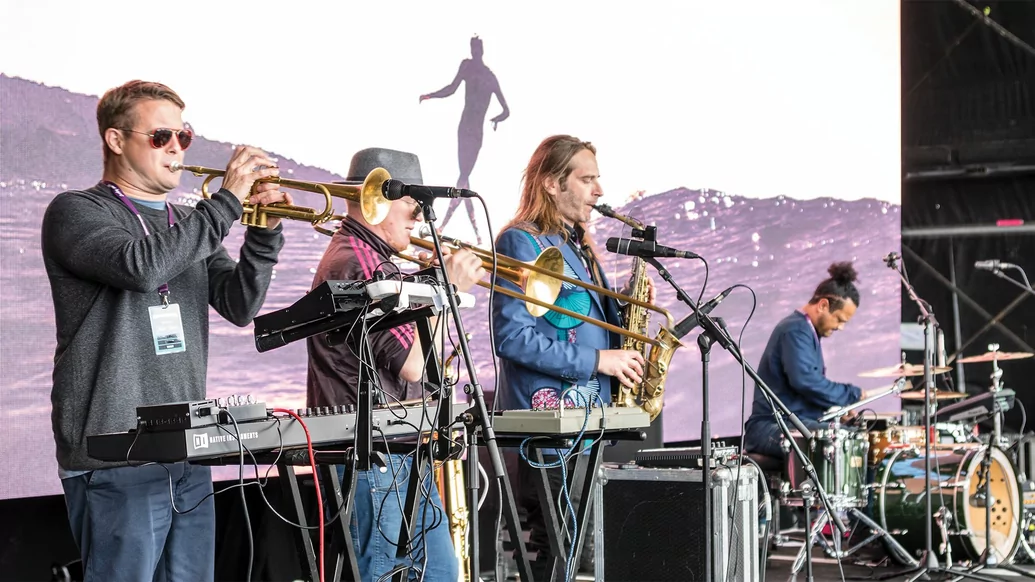

“On this record, we made a conscious effort to combine English and Ibibio. I find that people really want to sing along, especially when I invite them to sing little sections of the song. For me it’s an honour to see that” – Eno Williams
What holds the whole album together like glue is the skilful playing, with Joseph Amoako’s drums always on-point, and Scott Baylis’ synth tones deployed at just the right moment. Alfred Bannerman’s guitar, meanwhile, imparts a subtle funk throughout, something he’s cultivated with stints in famed Ghanaian-British Afro-rock band Osibisa, and KonKoma.
The band members bring a variety of different influences, from the obvious electronics and funk to elements of rock and disco. What’s vital to the project, though, is the presence of West African sounds. In addition to the more obvious artists associated with Afrobeat, like Fela Kuti, Tony Allen or Peter King, Ibibio Sound Machine draw a line back to Afrofuturist electronic pioneers, such as Cameroon’s Francis Bebey or Nigeria’s William Onyeabor.
“There are other people who have done that electronic mix a bit,” Max says, discussing the combination of sounds that Ibibio Sound Machine have made their own. “Have you checked out King Sunny Ade’s ‘Synchro System’? He was mixing in electronics back in the ’80s."
One of the record’s most poignant songs is ‘Afo Ken Doko Mien’, a rare change of pace on the otherwise upbeat album. Over cosmic keys, Eno sings in Ibibio, addressing her far away relatives and loved ones at a time when she was unable to see them in person, or travel.
“The lyrics say, ‘You told me that you would be with me, you told me that you would never leave me alone’. I remember talking to my sisters on the other side of the world, talking to friends and family, and wondering, ‘Oh my goodness, will I see these people again?’
“We got a friend of mine, Sylvia, to do an ethereal kind of thing with her voice, because she’s got a really sweet, high soprano classical style. Max put it through a vocoder, so you hear the machine-like element of her vocals as well."


Eno’s singing in Ibibio, a Nigerian dialect, helps give the band’s songs a distinctive rhythmic character — but on another album highlight, ‘All That You Want’, a huge track with a strong ’80s funk edge, the chorus and some other parts are sung in English. The language aspect sometimes represents a dilemma for the band, as Ibibio is vital to their musical identity and sound — yet they also want to widen their appeal, and for their live audiences to be able to sing along.
“‘All That You Want’ went through a lot of incarnations, because the whole thing was initially written in Ibibio, and it was a really good melody,” Max says. “And then our manager really liked that track and said it sounded like one of the more commercial things. He was like, ‘We should try and put the chorus and some of the lyrics into English’, and that’s where problems always start for us, because a lot of it is written in Ibibio first, and then you try to put it into English...” “It becomes cheesy,” laughs Eno.
“The language is a unique factor that has always set us apart,” Max adds. “It’s both a blessing and a curse. On the one hand, it is different, but on the other hand...” “People don’t understand,” Eno says.
“If you’re not singing in English, essentially, there’s a limit to your audience in the western world, it does put some limitations,” Max says. But for Eno, changing some of the lyrics isn’t so much of a compromise — instead, it’s a way for the audience to be able to participate and feel part of the band experience.
“That’s what has drawn people to the sound, because people immediately are like, ‘What is that? What is she singing about?’ We made an effort, especially when we’re gigging live, to give people the back story of each of the songs, especially the ones that are completely in Ibibio.
“On this record, we made a conscious effort to combine English and Ibibio. I find that people really want to sing along, especially when I invite them to sing little sections of the song. For me it’s an honour to see that, because when people like your music, they want to be part of it, they want to be able to sing along. So I was thinking, ‘You know what, maybe it’s time to, not lose the Ibibio, because then we would lose our identity, but incorporate a bit of English’.”
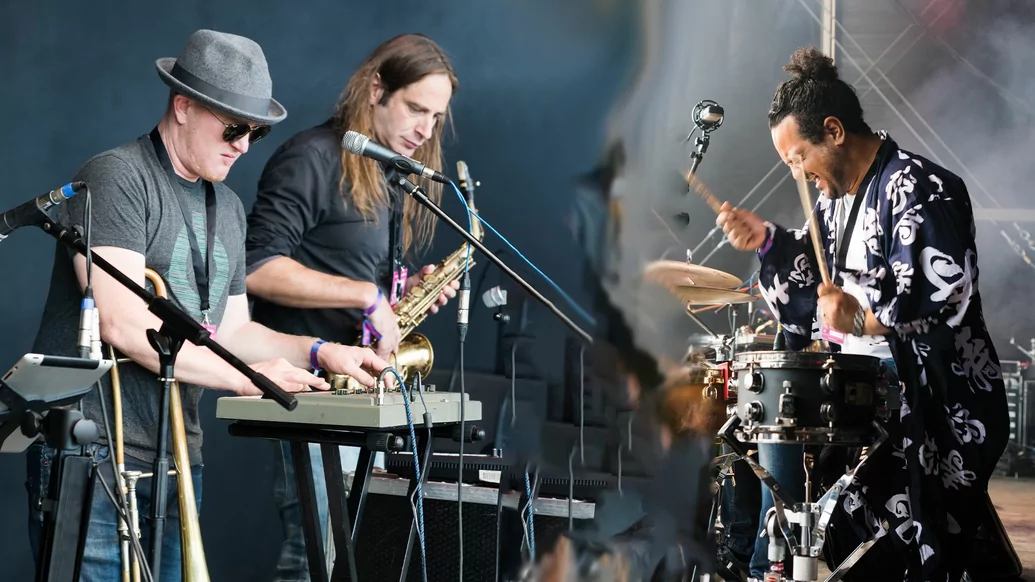
Ibibio Sound Machine formed in 2013, initially a bedroom music project devised by Max Grunhard, Leon Brichard, and Benji Bouton. Looking for a vocalist, they approached Eno Williams, who quickly became a full-time member. What really kicked the band into gear was hearing Eno’s Ibibio lyrics.
“Max was like, ‘Oh that sounds really rhythmic, what is that?’” Eno explains. “I said, ‘It’s just stories I got told growing up as a child’. From one song it became two songs, and then three. Then pretty much everyone came on board, Alfred came on board, and we had a percussionist. Everybody brought something different.” Their debut album ‘Ibibio Sound Machine’, released in 2014 by Soundway, made an instant impact. Featuring stone-cold funk pieces like ‘The Talking Fish’ and ‘Let’s Dance (Yak Inek Unek)’, it announced a major new band.
Leon and Benji left the group shortly afterwards, and it grew into an eight-piece, fleshed out by Scott Baylis’ synths, Joseph Amoako’s drums, Philip PK Ambrose’s bass, Tony Hayden’s trombone, and Anselmo Netto’s percussion. Each brought their own signature influences to the subsequent albums, 2017’s ‘Uyai’ and 2019’s ‘Doko Mien’, both released on Merge. “London being a melting pot of cross-cultures, people and vibes, that’s really what influenced us and helped us to be able to come together with all our different backgrounds,” Eno says.
Soon Ibibio Sound Machine will return to their happy place: the live stage. Though they did a few festival gigs last summer, Eno says they were a bit strange.
“I remember our first one back was in Manchester, where we had to be set up outside and it was socially distanced, and everyone was in their little pockets,” she says. “We got on stage, and it felt a bit weird because it was our first one in two years, and we had to go back into rehearsal, and remember things. It’s kind of strange when you haven’t done something for so long, and then you have to use the muscle memory to get yourself back into doing it.
"We got there and started the show, and people were wanting to get up and dance, and the stewards kept telling them to sit down! People wanted to dance and get involved and everything. So I said, ‘You can get up and dance, but make sure you stay socially distanced’. The stewards were like, ‘No!’ Eventually at the end of the gig everybody was just up, they couldn’t help themselves. It was really nice to see that, ’cause it felt for a minute that things were slowly coming back to normal.”
The band are really excited about getting back on the road with a UK tour in April, as they feel that to experience Ibibio Sound Machine live is the best way. “Our music is very much audience orientated,” Eno adds. “You can listen to it on the record, but I feel like to have the experience, it’s better to be at a live show, because we try to engage with the audience and get them to come on a journey with us, so we’re really looking forward to it. For a minute we thought it was going to be the end of live music, so we’re grateful.”
As to what the future holds, the band say they’re always recording music. But there’s one big ambition that they hope to fulfil soon. “Maybe we can try and get out to Africa to do some recording at some point, that would be fun,” Max says.
“That’s one of the things on our bucket list,” Eno adds. “We have to try and do it soon.”
